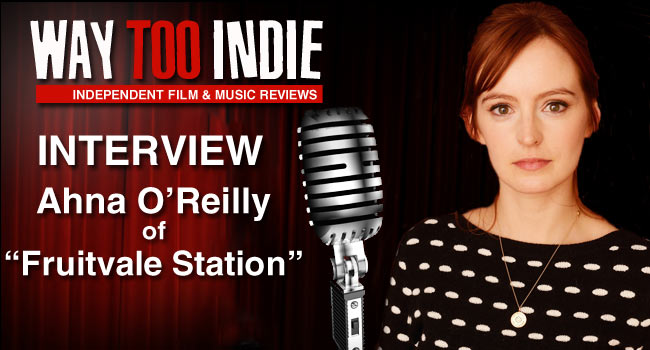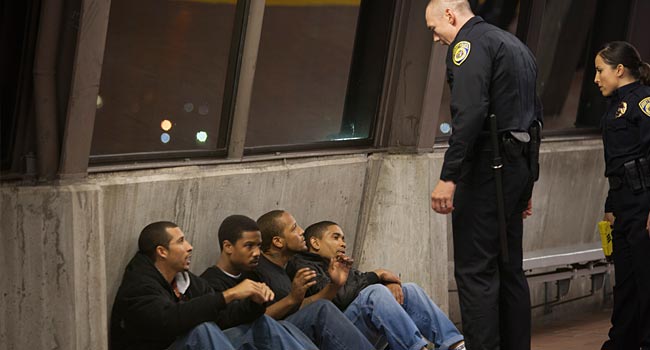Interview: Ahna O’Reilly of Fruitvale Station

We spoke to Ahna O’Reilly (The Help) who plays Katie, a girl who meets Oscar by chance, shares a pleasant interaction with him, and later becomes a witness to the horrific shooting in a tiny roundtable interview the day after the film premiered in Oakland. She talked to us about her friendship with The Help and Fruitvale Station costar Octavia Spencer, her first time watching the film with an audience, shooting at the titular train station, and more. Check out the edited transcript below.
Read More Fruitvale Station Interviews:
Ryan Coogler
Michael B. Jordan and Octavia Spencer
Melonie Diaz
How was the premiere?
It was wonderful. I felt more excited for this premiere in Oakland than any one we’ve had.
How familiar were you with the story of Oscar Grant?
Embarrassingly, not enough. I lived in LA at the time it happened, but my parents still lived here. I remember talking about it with them vaguely. One of the things that is most crazy and upsetting about this is that I didn’t have one conversation with people about it in LA. Most people that see this movie, this is the first they’re going to hear of it. One of the main differences between the premiere last night (in Oakland) and the other premieres we’ve had—at Sundance, at Cannes—is that most of those people had no idea who Oscar Grant was. When I’m talking to people about this movie, it’s rarer that they know who Oscar Grant is. That is tragic.
You don’t work with her on the film, but talk about your friendship with Octavia and how she got you involved with the film.
Octavia and I worked together on The Help, but we actually worked together before that. She and I have been friends for years. She’s one of my best friends. I was working on a film in Savannah, Georgia at the time they were shooting Fruitvale Station. She called me and she said, “Can you come be a part of this movie? We need someone to play this part. Please please please?” I was like, “I would do anything for you!” I read the script and I thought, she’s giving me such a huge gift. She’s acting like I’m doing her this huge favor, but she’s just given me such a gift. Being from the Bay Area, to be a part of telling this story, to be working with such an incredible group of artists—it doesn’t get any better.
Is your character is based on anyone?
Ryan told me that [my character] was a combination of a lot of different people. Because it was a combination of people, I didn’t feel I had to base my character on someone 100 percent real. There wasn’t someone I had to go interview. Because this movie came to me so last minute, I was kind of thrown into it. I watched the Youtube footage, I read up on it, but I was kind of thrown into it, which was perfect, because that’s what it was on the train—everyone was just thrown into that dramatic and heart-wrenching and horrible situation. It worked for me to just show up. The grocery store scene is just someone talking to me out of the blue. I actually had no real preparation to do other than I wanted to do my research on Oscar Grant.
Your scene with Oscar in the grocery store goes a long way in showing what kind of a guy Oscar was.
I think the scene is so lovely in that we see Oscar being a great dad, we see him in this moment with this dog, and then we see him having a total random act of kindness with a stranger, and that is such a beautiful trait in him to just want to lend a hand to a community member. Ryan was talking last night about how a lot of what this movie is about is community. I love that little random act of kindness. I think we’re increasingly closed off to the people around us—we’re always on our phone, we’re not looking up and taking people in. That’s what I’m doing in the scene. I’m totally ignoring him, kind of hoping he’s not going to keep talking to me. That’s how I often feel in life, and I have a sense of shame about it. Why didn’t I just say hello to the person helping me out? Why didn’t I just ask them how their day was going? Those little things matter so much. It shows a beautiful side of [Oscar.]

How was it was it watching the movie for the first time with an audience at Sundance?
[It was] incredible. You could hear a pin drop towards the end of the movie. All you heard was people being emotional. [It] didn’t matter—age, sex, race—everyone was shocked. I was a mess. I was sitting next to Michael, gripping him. I knew [the film] would be powerful, but what Ryan did with it really bowled me over. When you have a film going to Sundance, the fact that the film is going to Sundance is exciting, so I was already like, “This is great! We’re here! We made it!” I had no idea [the film] would have the life that it has. I think everyone’s pinching themselves, and it couldn’t happen to a greater group of people who are in this for the purest of reasons—to tell honest, socially relevant stories.
How was it working with Ryan Coogler?
The first scene I shot was the grocery scene, and it was a night shoot. I remember being in [the store] and seeing how he was interacting and talking with everybody and thinking I would literally serve coffee to people on set on his next movie. I want to be around him. He has such a quiet, powerful presence. I think one of the greatest qualities a director can have is finding the balance between being collaborative and wanting to hear everybody’s ideas, but also having a very clear vision. He totally embodied that.
(On the film’s script)
I think it’s brilliant that he started the movie with the real footage. Even if you’ve never heard of Oscar Grant, you know how it ends. The fact that he keeps us glued to the screen, knowing how it’s going to end—that’s an incredible accomplishment.
What was it like filming at Fruitvale Station?
That was one of the most powerful days of work I will probably ever have. On any day of work, you get there and it’s a little chaotic. Who’s going to hair and makeup? Who’s doing what? People are being rushed to where they need to go. Then, we all got [to Fruitvale Station] and it’s like, oh yeah, we’re here. We can see the bullet hole. Ryan took a moment of silence and a prayer circle. It was very, very powerful. Then, you have to get going because you have only until sunlight to make it happen. You’re dealing with a moving train. Those are technically difficult things to have to shoot. It was wild on many levels.
Not all of the train stuff was shot on the same day. The interior train stuff we did down at the Bart repair station. When we were on the Fruitvale Station platform it was a separate shoot.
Why is this film, about such a specific Bay Area community, able to touch people across the world?
I personally wondered how many Europeans watching [the film would know] what Oakland, California is. They know San Francisco, but will they know Oakland? It’s a really American story about a very specific place in our country. You wonder how it will translate [and if] the humor will resonate with them. When [the screening] was over, it got a 10 minute standing ovation. That was incredible. For this [tiny movie]—in terms of budget and scale—[to touch] people from around the world…I’m speechless thinking about it. It’s a universal story. Ryan is asking us, the audience, to think about how we treat each other as human beings. [Can we] erase our ideas about what you are because you’re black or you’re from Oakland or you’re 22 or you were in prison? Can we try to push all that aside and try to look at the heart of this person? People from anywhere should be able to think about that. I think that’s why it succeeds.
The French know about the American South. That’s something people have ideas about. They know about New York, Boston. Oakland? I doubt [it.]
